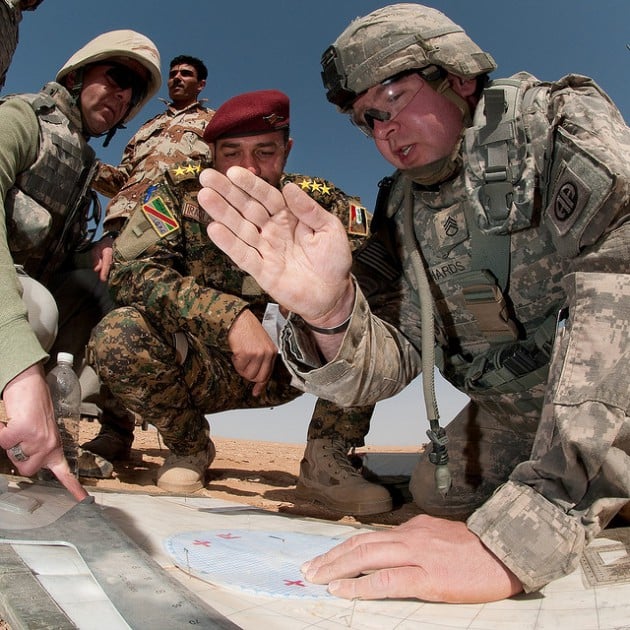How the Military Learns Languages

DVIDSHUB/Flickr US and Iraqi personnel talk strategy
What is the military method of choice for learning a language? Intensive, tailored tutoring. Read on for how the world’s most powerful militaries take care of language training.
If you seek the secret to learning language efficiently and well, common sense points to the strategies of those who need to become functional in the foreign tongue and fast: military personnel.
Military men and women make prime case studies for serious language learners as they frequently take on foreign assignments. Anyone relocating for work needs to speak the local language to do his or her best job in the new location; but the high stakes of a military assignment demand that more than just the interpreters have the ability to understand others and express themselves.
To boot, learning the local language provides valuable insight into the culture of the inhabited area, helping assignees achieve deeper understanding of their surroundings, get along better with the community and foreign coworkers, and, in some cases, prevent unnecessary conflicts.
So when it comes time to deploy, what is the language learning protocol?
Specialized Tutoring Arrangements for Unique Assignments
Naturally, military procedure differs by organization and from nation to nation. Within a given country, different branches of the military often have distinct guidelines. Universally, however, the secret behind efficient language learning is not such a secret: it’s just sufficient time and energy allocated to custom tutoring.
Language Trainers is proud to have worked with the US Army, the Ministry of Defense UK, the Salvation Army, and many other military and foreign affairs-oriented establishments.
Procedure may dictate that the military entity hire tutor(s) for a group for the purposes of a particular assignment or general promotion of language learning. The US Marines, for example, worked with Language Trainers to organize General French Language Training for the US Navy’s Mariners Reef Recreation Center in Portsmouth, VA, simply to give marines an option to study another language.
Oftentimes, it’s up to the individual assignee to select a language learning solution and attain approval from his or her supervisor.
Individual Military Language Learning Needs
Frequently, language learning requests made by military personnel are prompted by foreign assignments, as was the case of the US Army Assignments Officer who anticipated working in Brazil for four years starting in 2015 and signed up for a Brazilian Portuguese Language Course with Language Trainers in 2013.
Likewise, an officer in the UK’s Ministry of Defense who also awaited being stationed in Brazil tailored his tutoring plan to prioritize conversational speaking and achieve standard reading and writing skills. He arranged for LT’s Intermediate Brazilian Portuguese Course before departing with plans to do an immersion course once he arrived on site.
Requests for tutoring by individuals can also preempt such reassignments. A US Army Foreign Area Officer who speaks French for his professional language enlisted in a one-one-one French Language Course to improve his proficiency in case he was relocated to a Francophone country.
Of course, reassignment is not the only reason a military position may demand acquiring new language. Another UK Ministry of Defense worker was not reassigned but needed to learn conversational Arabic for his job and signed up with Language Trainers as he had no prior experience with the language.
Language Proficiency: Historically, a Recognized but Underserved Military Priority
Even as the US military has taken measures to prioritize language learning, in the past they have been criticized for moving too slowly. In 2008, the New York Times reported the extreme value of interpreters on the ground in Iraq and Afghanistan.

The U.S. Army/Flickr
While nodding to the efforts the US military made to institute language learning, the NYT called it “slow progress.” They ended the article by quipping that at least the government provides Rosetta Stone to soldiers free-of-charge, a blow as this software is not a full solution to obtain true proficiency, certainly not for crucial and difficult languages like Farsi.
In 2010, however, the US Military Language School was drawing positive attention according to Voice of America News, who cited them as one of the largest language schools in existence, teaching exactly those most crucial and difficult of languages.
Indeed, certain militaries have internal language schools that teach a portion of the personnel and run programs for evaluating language proficiency on staff. To keep up with standards, language students often find it useful to supplement their education.
Earlier this year, a US Army Major signed up for Language Trainer’s General Russian Tutoring Course to maintain his skills in preparation for the army’s annual test that consists of reading and listening.
Embrace the Solo Mission with Language Trainers
Today, everyone agrees that fluency in local language is a military necessity and that the capability should belong to more than just interpreters, but acquiring the language skills doesn’t always happen, or happen to the extent desired on a case by case basis, especially when the responsibility falls to assignees whose lives are busy.
Whether you’re an individual looking to best execute your assignment or a leader looking to train up your staff, it’s up to you to prioritize this important element of preparation in the way that works best for you and your team. Whatever the task, do not underestimate the importance of knowing local language; find a custom learning solution. Join ranks with the world’s most respected military organizations and opt for language classes specialized according to the goals of your operation with Language Trainers.
If you’re not in the military but interested to learn language efficiently, take inspiration for your own high stakes mission and design your program with a qualified language tutor.
